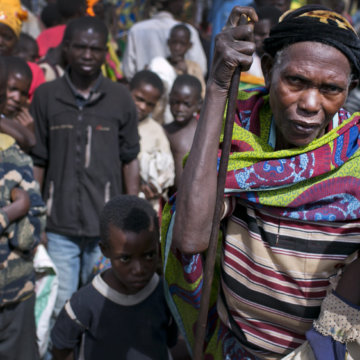- About
- Topics
- Picks
- Audio
- Story
- In-Depth
- Opinion
- News
- Donate
- Signup for our newsletterOur Editors' Best Picks.Send
Read, Debate: Engage.
At a recent climate convention for Africa, staggering statistics were released on a new phenomenon gaining pace but which is not getting the attention it deserves. The name climate refugees is increasingly dominating national, regional and international discourses as vagaries of weather become an everyday affair. Globally the number of people who have been forced by changing weather patterns to abandon their traditional ways of survival and move elsewhere in search of better days and lives is estimated at around 100 million according to the United Nations Framework Convention on Climate Change (UNFCCC).
Nowhere is this effect more felt than in Africa where the bulk of the population, 80 per cent, rely on agriculture, the worst hit sector by climate change, for livelihoods. Scientists are already predicting catastrophic effects in years to come, which will take their toll on Africa’s most primed agricultural crops.
The latest science estimates the average production losses by 2050 for African maize at 22 per cent, sorghum 17 per cent, millet 17 per cent, groundnut 18 per cent and cassava 8 per cent.
With agriculture contributing up to 30 per cent of majority of African national income and employing more than 70 per cent of the population, the impact is bound to be widespread. Farmers who have counted on their farms for generations to feed them and generate income to educate their children, open other businesses and take care of their other needs like health have to grapple with this new phenomenon.
Unable to fight back, the rural people are now fleeing their farms for greener pastures in cities which are not so green.
According to an annual survey by Africa Litmus, out of all the total population coming to cities from the rural areas in Africa, 30 percent is fleeing as a result of failed agricultural practices caused by failed rains. The locus of poverty is gradually shifting from rural to urban areas and is manifested in growing food insecurity with majority of those coming to the cities finding themselves worse off economically than they were back in the rural homes.
The numbers will grow, the woes will multiply unless humanity get its acts together. It is no longer a matter of if but when. Yet in the melee of changing weather patterns and food insufficiency nations can rediscover themselves. Africa has always been billed as a resilient continent, with a highly creative workforce that has homegrown solutions to homegrown problems. Hardly a year goes by without its scientists receiving international accolades for discovering transformatory innovations. That is the spark that should call the continent to action. Noble activities like brainfed agriculture and high superior seed varieties are surebets to insulating Africa from any threat to food production. Africa owes it to the future generations to make the continent food secure.
